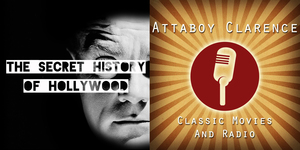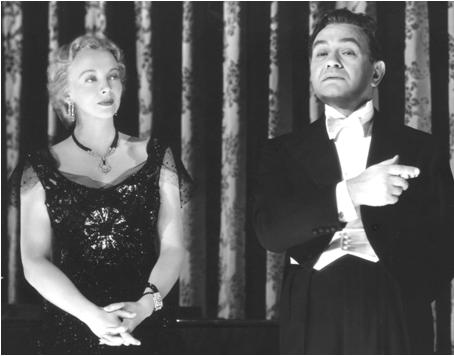"Darling, the stars can't hurt you"
Billed as a film-noir, this little oddity from 1948 is harder to categorise than that. Based on the novel of the same name by Cornell Woolrich, this supernatural thriller certainly comes with its share of noir framing. Indeed, the shadows can be so prolific, that sometimes it's difficult to tell where the frame of the picture ends, yet the supernatural overtones of the plot demand their presence, as though fate itself is encroaching on the very screen.
John Triton (Edward G. Robinson) is a fake psychic, who travels the country with his fiancee, Jenny (Virginia Bruce) and best friend Whitney Courtland (Jerome Cowan) with his show. Each night, he and his team fool the audience into believing that Triton is able to communicate with the other side by means of a neat trick involving background piano music.
One night, whilst in the middle of their act, Triton is seized by a genuine warning from beyond; a woman in the audience must at once return home, as her child is in trouble. Triton becomes subjected to random visions of the future, which at first mean that their penniless troupe is able to accumulate a fortune through betting and playing the stock market, but soon the visions take a macabre twist. Able to see the fates of anyone he encounters, but powerless to alter their destiny, Triton becomes terrified of his new power.
When a vision reveals that his beloved Jenny is doomed to die, Triton flees, believing his involvement in her life will be the cause. When the prophecy comes true anyway, he chooses to use his power to do everything he can to protect Jenny's daughter, Jean. When Jean turns eighteen, Triton is plagued again by visions, not only of Courtland's death, but of Jean's forthcoming murder. Triton finds that not only must he re-enter her life to prevent the tragedy from coming to pass, but also contend with the skeptics that surround her.
Robinson is terrific, once again demonstrating that he really could play any part. Here, he's perfect as the weary, cursed Triton, impotent with helplessness as he watches his prophecies live themselves out time and time again. He could so easily have relaxed into criminal roles in his early career, but instead refused to be typecast, and in doing so created a wonderful legacy of film roles. Gail Russell and John Lund don't really have that much to do, except mope and wring their hands, Lund in particular being rather a blank canvas, but the supporting cast is lifted immeasurably by the presence of William Demarest. His grizzled LIeutenant Shawn is the cop you'd want protecting you if your life was at stake. Granite-voiced and with a heart of gold, his turn is matched only by Robinson.
The film received some lukewarm reviews upon its initial release. It may be that the mood was a little too bleak. Certainly, in that respect, it's fair to refer to the movie as a noir. Woolrich's books were always a little drunk with a sense of doom and resignation, staples of the noir genre, but that doesn't make it an unenjoyable experience. Indeed, it strays quite a distance from melodrama, and from the pained overacting of some of its contemporary supernatural thrillers. The conflict in Triton is internalised for the most part, in his tormented eyes and in his self-imposed exile. When he does give voice to his terror, it's always in a burst, and never with self-pity.
John Farrow's direction is uniformly excellent, having honed his thriller skills with earlier hits 'The Saint Strikes Back' and 'Five Came Back'. He'd recently returned from war, and was just about to have his biggest hits with 'The Big Clock' and 'Alias Nick Beal', but 'Night Has A Thousand Eyes' belongs in the same breath, not only in terms of suspense and genre, but in going to prove that Farrow had a wonderful sense of smell when choosing his projects. His films always seem to have that narrative hook that makes the ears prick up a little, whether it's a psychic who discovers his powers are real, or a politician who makes a deal with the devil in a quayside dive.
From its bravaura opening scene, where Russell is saved from suicide on a railroad track, to its clever twist ending, it's an often missed treasure, overdue not only a re-release, but a reevaluation.





